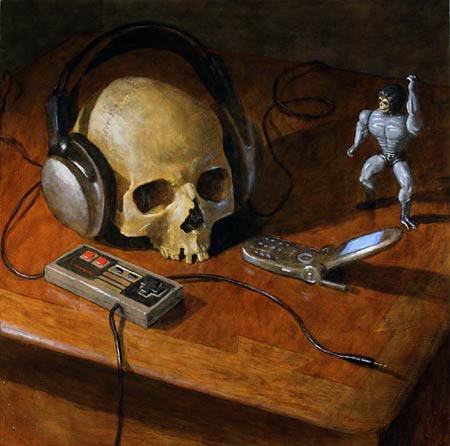For obvious reasons, a recurring theme in art history since the beginning of times, and in every culture, has been death. The discovery of death is a turning point in many children’s’ lives, including the life of one of my all-time favorite authors, Elias Canetti, who described his persistent fascination with death in Crowds and Power. While I believe that death is a “natural” human fascination, the concept of life and conception was a larger turning point in my life than death. What is interesting (and what I’m trying to get at) is that the philosophical concept of “death” and what is “dying” fascinates me more in SL than in RL. The reason for this, after much pondering is, I think, fairly simple – what fascinates me (as well as most with a fascination of death) is not the cessation of being (death) but rather what it means to be (live). In other words, if again using Dennett’s parable, I ask where I am if my brain is in a vat and I am controlling a body remotely, what kind of meaning does death have in such a context and perhaps, more simplistically, who truly “dies” – the avatar or the typist?
Dennett touches upon this issue in his story “Where am I” when discussing the tremendously complex idea of artificial intelligence and free will. At the very end of the short story, Dennett’s brain learns that at the inception of the project, a computer program was created that is an exact, real time replica of Dennett’s brain. This “artificial” brain could easily be connected and control yet another body. Dennett’s brain reasons that while he wouldn’t know which would be him because he thinks both ARE him, he contradicts the common view that identity implies uniqueness. Since Dennett’s brain thinks that the computer program is him, he does not want this artificial intelligence to be without a body. To solve the ethical dilemma, the scientists and Dennett’s brain agree to use both, switching from one to the other without the conscious knowledge of being either. With that, Dennett has secured immortality or has he? After all, where is Dennett?
The same can be said of avatars. A while back I started watching a SyFy series, Caprica, which dealt with a similar topic – a young girl died in a tragic accident, but her avatar (who, like in Dennett’s story is run by a computer program that is a real time replica of the dead girl’s brain) survives her. Again, is the person really dead, or have they simply been “reincarnated” into another, albeit virtual, body?
I did not start this post by stating that death has been a constant theme is art history for no reason. I have noticed that while death is a part of virtual reality, in part because it is part of our actual reality and, for now, both are inextricably entwined, death as not permeated the soul of virtual art in the same manner as it has RL art. Art, is after all (or at least in my opinion), the most accurate reflection of a society’s culture and values. If death, or our present conception of death, is somehow altered by artificial intelligence, why wouldn’t this facet of our culture and values be reflected in virtual art?
While I do not agree with everything he says, Garaci’s Apocalytic AI is an interesting read on the subject. Obviously, from the title, the author takes an apocalyptic and fundamentally dualistic approach (you have to, if you believe that your spirit can be reincarnated into an avatar) that is drastically different from the Heidegerrian approach I am taking in my study. Pondering such questions does, however, does raise important points and issues to be considered. What do you all thing?
If you’re interested:
Geraci, R. M. (2010). Apocalyptic AI: Visions of heaven in robotics, artificial intelligence, and virtual reality. Oxford: OxfordUniversity Press.

I think bodies and minds both matter to “who” I am. The body is both the sensing and action without which the mind’s cognition would probably get pretty abstract.
I had a very attractive friend who once said, and we both laughed as soon as she said it because it sounded so cheeky, but she actually meant it quite sincerely, “I think I’d be a better person if I wasn’t so hot.”
She’s actually a sincere, serious, hard working person. But she’s also been asked by someone out every single day of her life.
So for sure she is a “mind” but that mind’s experience and knowledge of the world really can’t be separated from the way that world responds to her body.
What if Stephen Hawking and Kim Kardashian did a body swap? What would Hawking’s brain do, what what would “it” be in Kardashian’s body. And visa versa.
What if 2 avatars traded typists for a day or week? What would that experience be?
That might be a big logistic project, but what if we put out a challenge to change your avatar shape: make yourself 20% taller or shorter than you are now… or 20% thicker or thinner… or perhaps change other aspects…
Inhabit that exclusively for a week.
Blog it.